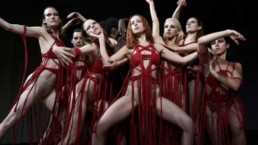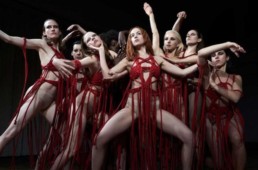‘Suspiria’ Channels the Manic, Feminine Mystique
This is a custom heading element.
It’s been said that life is all about balance: light and dark, order and chaos, good and evil.
In allegorical terms, it’s clear to see how these qualities have been portrayed in gender senses. The idea of God and government is seen as having a masculine, “male” energy. Its opposite – temptation and unpredictability – has been embodied as feminine, “female” energy, as life itself offers dark uncertainty. Male-dominated hierarchies have long been apprehensive of women, fearing “the unknown.” Which is all to say, Suspiria – the all-female coven horror film from director Luca Guadagnino– is the perfect film to offer haunting and electric feminine energy for these times.
A remake of the 1977 technicolor art-house horror flick, Suspiria follows an all-female dance academy where mysterious things are thought to occur inside the compound’s walls. There’s certainly danger in the politically-charged 1980’s in East Berlin where this movie takes place, the compound itself sitting just on the other side of the oppressive Berlin wall. The dance academy has been around for decades and is run by Madame Blanc (Tilda Swinton) and her legion of ladies. The women not only maintain order in violent and unstable times but also run one of the most prestigious dance academies in the world. It’s where American transplant Susie (Dakota Johnson) arrives from her small-town in Ohio – coincidentally, as several lead girls crumble under the academy’s pressure (imagined or real?) – and impresses them all by dancing the lead solo on her first day of auditions, which results in everyone questioning who she is.
As Susie rises higher and higher, fellow dancer Sara (Mia Goth) grows highly suspicious of the oddities that seem to occur during Susie’s lead performances. Luca Guadagnino, who last year directed Timotheé Chalamet in Call Me By Your Name, makes this movie an art house exercise that operates with more mystery than on pure horror. He builds an atmosphere of unease into the academy’s walls, not unlike the eeriness of The Shining and because of this, at best, Suspiria will be polarizing and at worst, underwhelming.
…powerful thrusts and quick choreographed moves are set to inhalations and exhalations that ebb and flow to build to a symphony of senses and orchestration of evil.
What separates this remake from the 1977 version directed by Dario Argento is Guadagnino’s filming of the dance at the center of the film. Guadagnino is certainly one for understanding how senses play to the audience. Here, he fully orchestrates evil with a primal and animalistic expression compared to the ballet scene of the original film, where powerful thrusts and quick choreographed moves are set to the ebb and flow of inhalations and exhalations, building to a symphony of senses and an orchestration of evil. But it’s the time in-between these moments– a politically uninteresting side story, and a barely motivated Dr. Josef Klemperer (look closer at “his” makeup and re-look at Tilda Swinton’s credits in the film) that had me wishing Suspiria would’ve left me even more breathless.
Suspiria is an overall fascination for the senses, with its details and artful moments, but it lacks some of the core ingredients that make horror movies fun. It’s undeniably expertly crafted, and when it goes off the rails in the film’s head-spinning (or head-exploding) ending, it’s quite simply one of the most bizarre moments in movies this year. But even with that, Suspiria is not as shocking as it could be, making me think these ladies may not be entirely satisfied.
152 min. ‘Suspiria’ is rated R for disturbing content involving ritualistic violence, bloody images, and graphic nudity, and for some language including sexual references. Now playing in theaters.
Ryan Rojas
Ryan is the editorial manager of Cinemacy, which he co-runs with his older sister, Morgan. Ryan is a member of the Hollywood Critics Association. Ryan's favorite films include 2001: A Space Odyssey, The Social Network, and The Master.


